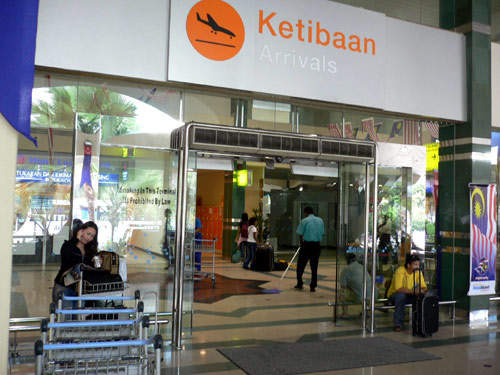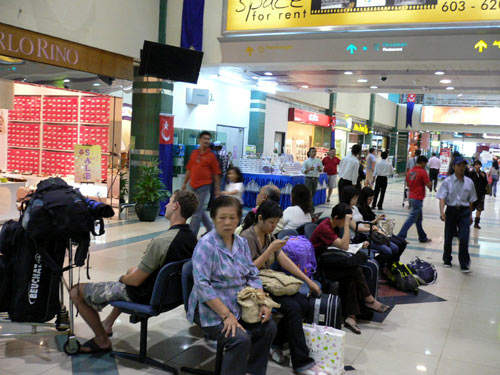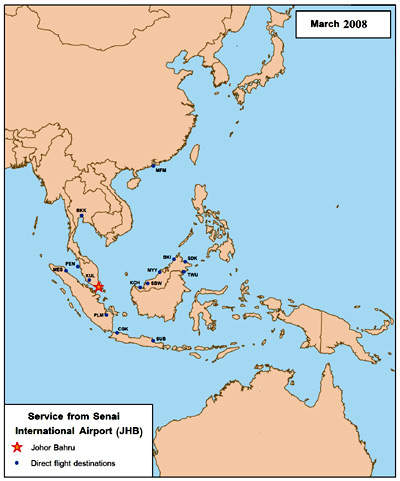Senai International Airport, officially known as Sultan Ismail International Airport, is located in one of Malaysia's strategic development zones. This development zone includes a structured highway and a proposed railway network.
The airport is emerging as a gateway to the major cities of Asia, realising greater connectivity with China, and granting easy access to the modern port facilities of the Tanjung Pelepas Port, Johor Port and Singapore.
The strategic importance of Senai International Airport has to be understood in terms of Malaysia's geography and its proximity to Singapore, Thailand and Brunei Darussalam, Vietnam, Myanmar and Cambodia. This region has potential for tourism and commerce, with a four-hour flight radius reaching out to Hong Kong, Macau, Guandong, North Australia, India, the Philippines, Indonesia and Indochina.
Senai International Airport offers customised solutions to logistics providers, freight forwarders, airlines, shipping and multimodal transport operators as well as air travellers. The multimodal connectivity of Senai International Airport stretches the span of Peninsula Malaysia – from the north right up to the southern-most point, 20km north of the ports of Singapore. Also in the pipeline is a double-track railway network that stretches from Singapore to Kunming in China.
Cargo facilities
Senai International Airport features a comprehensive range of aviation, cargo, logistics and passenger facilities. The Senai cargo centre has a built-up area of 3,600m² and is capable of handling up to 100,000t of cargo a year.
Equipped with a one-stop customs facility, the cargo centre uses the latest technology, equipment and practices, in line with the global industry standards. The centre has a dedicated dangerous goods area and a build-and-break area. It can also handle and store perishable items.
Latest Senai Airport developments
New short-term developments include the extension of a grooved runway, a parallel taxiway and associated high-speed turn-off taxiways to increase runway capacity, expansion of the parking area to accommodate 800 cars, and the development of a cargo agent complex with 40 units of cargo agent offices, perishable facilities, a warehouse and logistics centre. Expansion of the passenger airport is also planned.
Long-term developments include the setting up of a new exhibition centre, being built by Johor Corporation, and further increase of facilities so that they can handle up to two million tons of cargo. This will include additional warehouse and logistics facilities in a 3,000-acre expansion.
Senai Airport Terminal Services (SATS) has developed a comprehensive 20-year master plan to transform Senai International Airport and its surroundings to a world-class airport city. This means an increased focus on transportation, logistics, and commercial, retail and tourist development.
Logistics and aviation-related industry development is being carried out in several phases.
of Senai International Airport stretches the span of Peninsula Malaysia.”
During phase 1 (2003-2006), runway extension from 3,354m to 3,800m, and the development of Cargo Agents Warehouse and GSA were carried out. Also Senai Perishable Centre, Senai Livestock Gateway and Senai Free Zone have been developed.
In phase 2 (2007-2010), a new taxiway is being developed, the passenger and cargo aprons, and the airport terminal will be extended to accommodate five million passengers annually are being taken up.
Development of the Senai logistics park, an ornamental fish distribution and trade centre, a floriculture distribution and trade centre, an aircraft parts and distribution centre and an aviation training centre is underway.
During phase 3 (2011-2023), a Senai logistics hub, an oil and gas supply base warehouse, and a maintenance, repair and overhaul centre will be developed.
Commercial development
During phase 1 (2003-2006), an airport terminal retail area, the Senai integrated transport terminal and the Senai transit hotel were developed.
In the phase 2 (2007-2010), a rail transit link, and duty free and retail facilities are being developed. The development of lifestyle apartment suites, a business park, and a trade and exhibition centre is also scheduled for this phase.
A family theme park and a sports and recreation park are also proposed as part of phase 3 (2011-2023).
Aero mall
The aero mall is the first stand-alone external airport mall in Malaysia. The RM70m mall offers 83,375ft² of retail space. Emerging as a new lifestyle hub in the area, the aero mall provides a location for shopping, dining and entertainment. The mall is currently under construction.
The aero mall is due for completion by December 2009 and will open for business in 2010. It was designed by Hintan Architects, and constructed by Malaysia's premier construction group, IJM Corporation Berhad.
The mall is a natural extension of Senai International Airport's current services to better serve valued customers and business partners. With more than 45 major multinational manufacturers and almost 40,000 people working and living within a 2km radius of the airport, the aero mall is set to serve as a focal point for the rapidly expanding Senai commercial, industrial and residential hub.
Senai International Airport's free zone
The 200-acre Senai free zone (SFZ) is managed by Senai Airport Terminal Services Sdn Bhd (SATS). As part of the Senai International Airport, SFZ is just five minutes away from Senai Cargo Terminal and within a four-hour flight radius of Hong Kong, Macua, Gangdong, North Australia, India, the Philippines, Indonesia and Indochina.
SFZ has a strategic and cost advantage. With Tanjung Pelepas, Johor Port, KTM Railway and Senai International Airport within proximity, SFZ creates better logistics for movement of cargo to all over the world. As it is located outside the primary commercial centres SFZ assures lower land, labour and operational costs.
Aviation park
The 50-acre aviation park is managed by SATS and operations commenced in 2007. The aviation park provides a congenial environment and facilities to global aviation industry to carry out fixed-based operations, aviation training, aircraft maintenance, manufacturing and assembly, and logistics and distribution.
Takeover
MMC Corp's shareholders approved a plan to buy SATS for RM1.7bn. This announcement came in March 2009. MMC will pay RM580m for SATS and RM1.12bn for land for developing an airport city.




